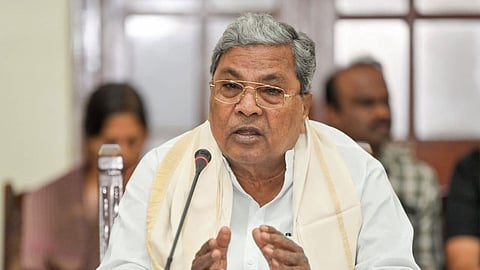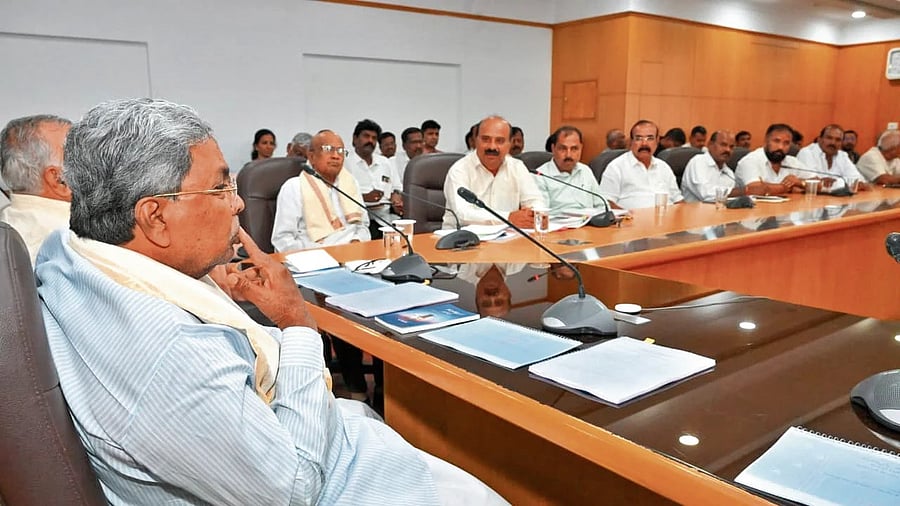Unions representing employees of Karnataka’s state-run road transport corporations have intensified demands for immediate payment of pending salary arrears and a comprehensive pay revision. Leaders from the four state transport corporations — KSRTC, BMTC, NWKRTC and KKRTC — met Chief Minister Siddaramaiah to press for resolution of long-standing issues. Their demands include release of arrears accumulated over three years, merger of allowances into basic pay, and a structured wage revision. However, the meeting ended without a firm decision, leaving workers anxious about their financial future and signalling the possibility of fresh protests.
The likelihood of protests has also prompted discussions within the government on how to prepare contingency plans. Senior officials are said to be evaluating whether essential services can be maintained using temporary staff or limited fleets in the event of a strike. However, union leaders have warned that any attempt to dilute worker participation or break their unity will only worsen tensions. They argue that the government must prioritise constructive negotiation rather than exploring alternatives that undermine workers’ rights. The administration, for its part, faces a delicate situation in appeasing employees without destabilising public services.
For commuters across Karnataka, memories of earlier bus strikes remain vivid. During previous agitations, thousands of passengers were stranded at bus stands, forcing many to pay steep fares in private vehicles. Students preparing for board exams, daily wage workers, and patients needing to travel long distances for medical treatment were among those most affected. This history has raised a sense of urgency among the public, who fear the same disruption could occur again if the current dispute escalates. The growing public anxiety is now adding pressure on the government to find rapid solutions.
Many transport workers have also voiced concerns about retirement benefits, an issue they feel has been overshadowed by the wage dispute. Drivers and conductors say that even after decades of public service, they retire with insufficient benefits to meet basic needs. Some employees have demanded that pension schemes be strengthened and that retirement eligibility rules be made more inclusive. They argue that long working hours, irregular schedules, and exposure to road-related risks justify stronger social security. Union leaders believe that including pension reforms in the current negotiations will provide long-term stability and better worker morale.
Another point raised by the unions pertains to unsafe working conditions. Workers claim that long hours on poorly maintained roads, inadequate rest facilities, and lack of stress-relief support contribute to health problems among staff. They say that drivers often complete lengthy shifts without proper breaks, especially on rural routes where turnaround times are tight. Conductors handling overcrowded buses face strain too, particularly during festival seasons or school hours. Unions insist that addressing workplace safety must go hand in hand with wage correction, as public service cannot be sustained on exhausted, undervalued labour.
The issue has sparked debate over how public transport should be financed in the long term. Some policy observers suggest that the state needs a more predictable funding mechanism for RTCs, similar to the way education and healthcare budgets are allocated. They argue that relying solely on ticket revenue, while expanding free-travel schemes and maintaining low fares, puts unsustainable pressure on corporations. A separate transport welfare fund, financed by urban planning taxes, fuel cess, or dedicated levies, has been floated as a possible solution. Such models, experts say, could stabilise budgets while protecting worker rights.
Private bus operators have also begun watching the situation closely. While some welcome the possibility of increased business during a strike, many fear that large-scale dependency on private fleets may trigger regulatory chaos. They worry that sudden increases in demand will strain their capacity, lead to inflated fares, and draw public criticism. Operators say that they do not want to appear as profiteers during public distress. Instead, they support a solution that keeps RTC fleets stable. The industry has therefore urged the government to solve the dispute before it spirals into an uncontrolled market shift.
Civil society groups and labour activists have begun expressing solidarity with the workers. They argue that the struggle is not merely about wages, but about respect for essential service providers who maintain public mobility. Activists claim that the state must stop treating transport employees as replaceable labour and instead recognise them as custodians of a crucial public good. Some groups are planning awareness campaigns to highlight worker grievances and encourage commuters to support dignified labour rights, even if it means temporary inconvenience. The unions see such support as vital in building broad-based pressure.
The next round of talks is expected to be a turning point. Union leaders have made it clear that they will not settle for symbolic gestures or partial settlements. They want a time-bound commitment on wage revision, arrears disbursal, pension improvements, and workplace safety reforms. For the government, any decision will have implications beyond transport policy, potentially influencing labour negotiations in other public sectors. The resolution of the RTC conflict will therefore serve as a test of political will, fiscal planning, and the state’s regard for working-class welfare. The outcome may redefine the balance between public needs and worker dignity in Karnataka.
Union representatives argued that the delay in wage enhancement has placed severe financial stress on employees, especially drivers, conductors, and mechanics, many of whom have had to bear rising costs of living without salary corrections. Multiple rounds of discussions over the past months have not resulted in a concrete outcome. At the latest meeting, the Chief Minister reportedly offered to release only a portion of the arrears instead of the complete amount sought by employees. Union leaders expressed disappointment, calling the offer “inadequate,” leading to a stalemate that has triggered fears of strikes across the state.

TRANSPORT SERVICES AT RISK AS TRUST BREAKS DOWN
The unresolved dispute has raised concerns over the continuity of bus services across Karnataka. Union leaders have warned that unless the government responds holistically, they may revive strike plans that were temporarily held back earlier this year. An indefinite transport strike would heavily impact daily commuters, many of whom depend solely on state buses, particularly in rural areas. Students, workers, and women commuters are expected to face the harshest consequences in the event of disruption. The uncertainty has pushed many commuters to prepare alternative arrangements, despite the fact that private transport operators have expressed limitations in taking on such a massive load.

Workers say their frustration stems from years of being promised solutions that never materialised. State welfare schemes such as free bus travel for women, rollouts of new fleets with electric buses, and other public commitments are viewed favourably by commuters, but employees argue that these initiatives place additional operational stress without being accompanied by fair remuneration. Many rank-and-file workers claim the mismatch between rising workload and stagnant income has forced them into debt. The unions emphasise that public service workers should not be left financially vulnerable as they uphold essential mobility for the state.
The unions also insist that the government must recognise the vital link between fair pay and quality of service. They argue that professional dignity and long-term retention of experienced staff are key to maintaining efficient transportation services. Repeated delays, they claim, weaken staff morale, discourage new recruits from joining the sector, and compromise public safety and service quality. For the government, the challenge is to resolve the situation without compromising its budget priorities, as various welfare and infrastructure schemes are already imposing pressure on state finances.
ECONOMIC IMPACT: BALANCING FINANCE AND WORKFORCE EXPECTATIONS
The demand for full arrears settlement comes at a time when the state is grappling with fiscal constraints. Officials have pointed to pandemic-era losses, rising fuel and maintenance expenses, and additional expenditure on public schemes as factors limiting the government’s ability to meet all union demands immediately. The state’s transport corporations continue to face operational challenges, with fluctuating revenue streams and increasing pressure to expand bus fleets without proportionate funding. Economists note that reforms such as fare restructuring and operational efficiency measures may be required to ensure long-term stability.
Union leaders, however, reject the notion that workers should bear responsibility for financial shortfalls. They argue that employees are being penalized for structural failures and policy decisions beyond their control. According to them, wage revision and arrears payment are essential rights, not concessions. Any fiscal restructuring, they insist, must protect worker benefits while addressing systemic gaps. They advocate for transparent audits, periodic salary reviews, allocation of fixed drivers for electric buses, and clear policies that safeguard workers’ interests amid technological and operational shifts.
As the dispute deepens, stakeholders emphasise the need for a cooperative solution rather than confrontation. Experts suggest that a middle-path approach — releasing arrears in phases, fixing a clear timeline for pay revision, and creating safeguards for workers — may ease tensions. At the same time, accountability measures and strategic planning could help improve the financial health of the transport corporations, ensuring that neither workers nor commuters face recurring crises. The outcome will likely shape how essential public services are managed and valued in the state.

POLITICAL PRESSURE, PUBLIC EXPECTATION, AND THE ROAD AHEAD
The government has scheduled another round of negotiations with the unions, signalling an intent to avoid escalation. The Transport Minister is expected to reassess financial options and present revised proposals. However, the unions have indicated that without a firm commitment, they will not rule out agitation. The situation places the state leadership under growing political pressure, as prolonged instability in the transport sector could reflect poorly on governance, especially in regions where bus networks are indispensable for education, employment, and healthcare access.
Public expectations are rising, with commuter groups urging both sides to reach a timely agreement. Any prolonged standoff risks eroding trust in public transport and shifting commuter dependency to private vehicles, which may increase congestion, costs, and inequality in mobility access. The coming days may prove decisive not only for the fate of RTC workers but also for the future of Karnataka’s transportation model. Resolution will require balancing fiscal realities with labour rights, and acknowledging that sustainable mobility depends on a motivated workforce.
Follow: Karnataka Government
Also read: Home | Channel 6 Network – Latest News, Breaking Updates: Politics, Business, Tech & More

